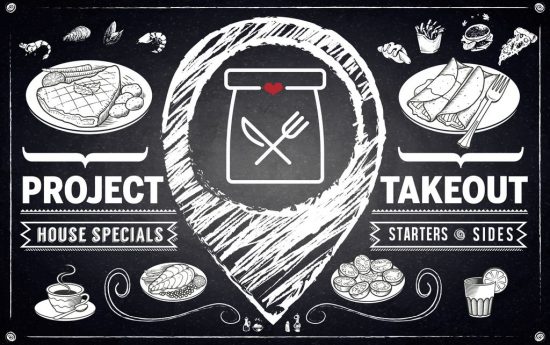How the Boston Globe encouraged readers to support restaurants through #ProjectTakeout
On Jan. 15, the Boston Globe launched Project Takeout, an initiative spearheaded by food writer Devra First, which encourages Boston residents to order takeout and support the restaurant industry while in the midst of the pandemic. The project features a variety of stories that highlight different restaurants in the Boston area and present the issues that restaurants are dealing with. The project also asks readers to spread awareness by posting photos of their takeout meals using the hashtag #ProjectTakeout.
Storybench spoke with First about how Project Takeout came together, what she hopes the project will accomplish, and how people can get involved.
This interview has been edited for length and clarity.
How would you explain Project Takeout to someone who is unfamiliar with it?
Right now, independent restaurants — the kinds we all love to go to and enjoy, and enrich our communities and our small, local businesses — they’re really hurting because COVID hit them really hard. They had to reduce capacity, they had to shut down indoor dining; they’ve been really reliant on takeout. Outdoor dining was really helpful during the warm weather for many people, but that hasn’t been an option for some time. And these people are still on the hook to pay their rent, utilities, all the usual bills and fees. They’ve been in it for a while and these months of winter are generally pretty slow anyway, so this time is really hard for them.
We were looking for a way to help out at the Boston Globe so we thought, “Well, how about this Project Takeout?” It was our editor Brian McGrory’s idea initially and we thought, “Well, what if we ask everyone to really, for the next few weeks and months, to really intentionally commit to getting takeout, as is financially feasible for people, in order to support these restaurants?”
“Before the pandemic, it was about one out of every 10 jobs that were inside of a restaurant. So supporting these restaurants really helps support all the people who work there.”
Devra First, Boston Globe Food Writer
A lot of small businesses obviously are hurting right now, but restaurants have been really hard hit. One reason we thought that was particularly important is because of how many people restaurants employ in the Massachusetts economy. Before the pandemic, it was about one out of every 10 jobs that were inside of a restaurant. So supporting these restaurants really helps support all the people who work there. A lot of undocumented workers find work in restaurants. So even though right now, running a restaurant like this isn’t really profitable at all — maybe you’re breaking even, maybe you’re losing a little — but a lot of people have chosen to stay open rather than hibernate for the winter in order to keep the undocumented workers who don’t have a lot of recourse employed and other workers as well. So supporting your local restaurants supports these smaller dependent local businesses, but also the many, many people that they support. Restaurants are such a part of the fabric of our communities, and so it also ties into real estate and how you want your neighborhood to feel and just the character of every city, neighborhood, town. So we felt this was a really important sector to focus on.
Was there a certain moment or story that inspired you to do something to help?
I think even more than it being any one specific story, it was hearing the same story time after time after time after time. No matter who I spoke with in my reporting, or my colleagues spoke with in their reporting, or the editors spoke with just in talking to people within the community, the story is really the same. From the fanciest, white-tablecloth, super special occasion restaurant down to the little mom-and-pop neighborhood place, everyone is really in the same position on a different scale. Unless you’re in a well-funded chain, [Paycheck Protection Program] was helpful for some, not all. So I think it was really the volume of the same story over and over and over again.
How do you envision this project serving Boston’s restaurant industry?
Everyone that we spoke with, and it seems just like a drop in the bucket, but every owner or restaurant person that we spoke with said that every little bit helps and felt that this was a worthwhile endeavor. I make the comparison in the initial story I wrote when we launched the project to the Victory Gardens movement of World War I and II because it was a campaign for people to grow their own fresh food and everyone got in on it. It really made a huge difference. They just grew an incredible percentage of food during that period of time.
We just thought that if this can catch on — it’s not permanent, it’s really until the warm weather, until outdoor dining returns, until people get vaccinated on a wide scale and people feel comfortable returning to dining rooms — that if we raised awareness and enough people started participating, then it really could make a difference in people’s communities. And we’ve seen other people and towns and chambers of commerce take up the idea and run with it for their local community. So hopefully it can spread out in some way and at least make a difference for some businesses. Even just a couple more orders a night can really make or break a business for the week or the month. So that’s our hope.
How have other Globe reporters been getting involved with this project?
We want to support this project with ongoing editorial content to keep it top of mind and keep reminding people that we’re still hoping that you can do this. So we’ve had a lot of stories, like my colleague Janelle Nanos wrote a story about takeout containers and how expensive they are, and my colleague Kara Baskin has written many stories about all kinds of aspects of this.
But one thing we thought we’d do was to involve the newsroom as a whole. So we just sent out a message to all of the editorial staff and said, “Hey, do you have a favorite place that you love and want to tell people about? If so, would you write it out for us?” And the response was incredible! We’re running about three of these stories a week and we’re just going to keep doing it. People pitched multiple restaurants that they wanted to write about, and we’re trying to give everyone at least one chance in the rotation. It’s just weeks and weeks and weeks and weeks of content. I can’t remember ever getting this kind of a response to a message sent to all of editorial before. So there’s definitely a lot of enthusiasm. People really love their local restaurants and have really strong emotional connections with them, among newsroom staff as with the general public. So I think just the chance to shine a little light on our favorite places has been really welcome.
How has the project been received by the restaurant industry?
People from the restaurant industry have been really enthusiastic. A lot of people are posting their own food and tagging themselves and using the hashtag #ProjectTakeout. Or they’ll get takeout from their friend’s restaurant and draw some attention to their friend’s business, which is really nice to see. And readers and bloggers are also using the hashtag, posting images of their food, and tagging the restaurant that they got it from… There have been more than 500 posts.
Have you received any negative feedback?
I think that we’ve really seen a polarization in general in the country over COVID and that that is reflected within every community including the restaurant community. And because the restaurant community has so much at stake, people can have strong opinions about it. But I think, whether people feel comfortable dining in or not, people have the data now. People have read all of the recommendations from the epidemiologists and everyone in public health saying that dining in — from the current public health standpoint with the current definition of public health as being preventing people from getting COVID — that eating indoors is not advised, but people can decide on that, what they’re comfortable with. Because of the public health recommendations, we feel comfortable advocating for people to get takeout and to help that way.
I think that as much as businesses may be divided over whether indoor dining is safe or not, or whether people should be eating indoors, whether staff should be working indoors, and comfort levels with that, and levels of protection in the environment you’re going to be creating in your own business, I think nobody is going to object to more people getting takeout at this juncture. So I’m sure there are people who would wish for us to advocate to go ahead and do whatever you want, but I think this is the measure that we can take that’s prudent.
On the tagline of “Get takeout. It’s your civic duty,” can you explain why you think people should participate in this project?
This is sort of an ‘as you can afford to do it’ kind of thing. Getting takeout isn’t going to be financially feasible for everyone at all right now. There’s so much food insecurity out there and job loss, so obviously this is for those that can afford to do so. But for those who can, I think A) It makes sure that the places you love will be there on the other side of this pandemic and that we will still have places to gather with our friends and celebrate family occasions and eat delicious food that is unique — and supports our own local community, as opposed to a larger national chain. So that is the personal reason. And B) supporting any small, local business obviously supports our local economy, supporting the restaurant business in particular supports so many jobs. How many of us had our first jobs working in a restaurant or some other food-related business? How many people come to the country and find work in a restaurant kitchen and then maybe go to open their own business or put their kids through college? So it’s really supporting a large workforce and then also a workforce that pays it forward to the families who they support. For undocumented workers, I spoke with someone who said that many of these people send money back home to people who really depend on them elsewhere… It just really touches so many people to support these restaurants and try to help keep them in business.
And then there’s the feeling of our neighborhoods when there is a great restaurant in a neighborhood, that’s an anchor for the neighborhood that draws foot traffic, which makes the neighborhood safer. It brings in taxes, which is incidental. It encourages other businesses to want to open in the neighborhood and it, therefore, brings up property values. It’s just a whole cycle of things that can happen around one vibrant, local, independent restaurant. It just affects so many facets of personal life, business, civic life. It can be really wide-reaching. So that’s what we hope this project supports.
Do you have anything else you’d like to share?
One thing I will add is that during Black History Month, there [was] this Boston Black Restaurant Challenge that’s been going for four years now, which challenges people to eat at one Black-owned restaurant once a week for the month. I think that’s a really strong effort, and I also think that that’s something that needs to be happening every month of the year. When we look at what the restaurant community as a whole is grappling with, not everybody came into the pandemic on equal footing. A lot of Black-owned restaurants came in already with the legacy of racism, less ability to borrow money, less interest on capital. All things that have made COVID worse for the communities also make entering the pandemic more of a hardship when you already come in with debt or credit history issues, or anything like that, that makes this even more of a challenge.
“I want to encourage people to support all restaurants, but also to keep in mind communities that might need it more.”
Devra First, Boston Globe Food Writer
So I want to encourage people to support all restaurants, but also to keep in mind communities that might need it more: Like Chinatown, which really started feeling the effects of the pandemic … certainly in February, but even in January, [it felt] the effects of the previous administration calling it the “China virus,” and that coupled with people’s fear of entering the neighborhood and a million other factors. There’s just an extra two months of incredibly decreased business for particularly Chinatown, but many Chinese restaurants. So I think when people do think about where to get takeout from, obviously, sometimes you just got to get it from the place down the block. But also sometimes, if you have the wherewithal to think about supporting the communities that need it the most and who that might be and steer your dollars there, that’s really helpful and welcome as well.
Photo credits: The Boston Globe/ Project Takeout





